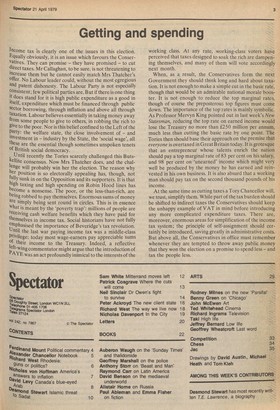Getting and spending
Income tax is clearly one of the issues in this election. Equally obviously, it is an issue which favours the Conservatives. They can promise — they have promised — to cut direct taxes. Mr Callaghan, to be sure, is not threatening to Increase them but he cannot easily match Mrs Thatcher's Offer. No Labour leader could, without the most egregious and patent dishonesty. The Labour Party is not especially Fonsistent; few political parties are. But if there is one thing it does stand for it is high public expenditure as a good in Itself, expenditure which must be financed through public sector borrowing, through inflation and above all through taxation. Labour believes essentially in taking money away from some people to give to others, in robbing the rich to give to the poor. Nor is this belief confined to the Left of the Party: the welfare state, the close involvement of — and investment in — industry by the State, the 'social wage', all these are the essential though sometimes unspoken tenets of British social democracy. Until recently the Tories scarcely challenged this Butskellite consensus. Now Mrs Thatcher does, and the challenge will probably win her the election. The reason why her position is so electorally appealing has, though, not fully sunk in on the Opposition and its supporters. It is that high taxing and high spending on Robin Hood lines has become a nonsense. The poor, or the less-than-rich, are being robbed to pay themselves. Enormous sums of money are simply being sent round in circles. This is in essence what is meant by the 'poverty trap': millions of people are receiving cash welfare benefits which they have paid for themselves in income tax. Social historians have not fully emphasised the importance of Beveridge's tax revolution. Until the last war paying income tax was a middle-class Privilege: today most wage-earners pay appreciable sums of their income to the Treasury. Indeed, a reflective left-wing commentator might argue that the introduction of PAYE was an act profoundly inimical to the interests of the working class. At any rate, working-class voters have perceived that taxes designed to soak the rich are dampening themselves, and many of them will vote accordingly next month.
When, as a result, the Conservatives form the next Government they should think long and hard about taxation. It is not enough to make a simple cut in the basic rate, though that would be an admirable national morale booster. It is not enough to reduce the top marginal rates, though of course the preposterous top figures must come down. The importance of the top rates is mainly symbolic. As Professor Mervyn King pointed out in last week's New Statesman, reducing the top rate on earned income would lose the Treasury no more than £250 million per annum, much less than cutting the basic rate by one point. The Tories then should base their approach on the premise that everyone is overtaxed in Great Britain today. It is grotesque that an entrepreneur whose talents enrich the nation should pay a top marginal rate of 83 per cent on his salary, and 98 per cent on `unearned' income which might very well be produced by the money he has earned and reinvested in his own business. It is also absurd that a working man should pay tax on the second thousand pounds of his income.
At the same time as cutting taxes a Tory Chancellor will, we trust, simplify them. While part of the tax burden should be shifted to indirect taxes the Conservatives should keep the unhappy example of VAT in mind before introducing any more complicated expenditure taxes. There are, moreover, enormous areas for simplification of the income tax system; the principle of self-assignment should certainly be introduced, saving greatly in administrative costs. But above all, the Conservatives in office must remember whenever they are tempted to throw away public money that they won the election on a promise to spend less — and tax the people less.






































 Previous page
Previous page